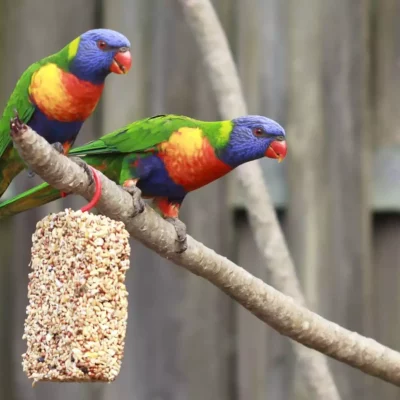September 17th is National Pet Bird Day! Polly may not be as popular as Fido and Fluffy, but she’s certainly won her fair share of devoted fans. Almost 3 percent of American households have birds. That may sound like a small number, but it works out to over 7.5 million. That’s quite a flock! A local vet offers some information on our feathered friends below.
Most Popular Birds
The parakeet—or Budgie or Budgerigar—wins the birdy popularity contest. It’s not hard to see why. These little balls of fluff are cute, affectionate, and lots of fun. Other popular birds include Cockatiels, African Grey Parrots, Finches, Quaker Parrots, Conures, and Canaries. Do plenty of research before buying one. For instance, a finch may be quite timid, and needs horizontal space. A parrot, on the other hand, may be quite feisty and active, and would require a tall cage that offers room to climb. It’s also important to consider longevity. Some birds live quite a long time!
Keeping Your Bird Healthy
Birds are quite fragile. Some of the medical issues that can affect them—such as egg binding—will be very new to someone who has only had dogs and cats. Do plenty of research, and learn to spot the warning signs of illness. These include erratic behavior, changes in waste, disheveled, broken, or missing feathers, and uncharacteristic vocalizations.
Celebrating Pet Bird Day
Like the rest of our animal companions, Polly really likes treats, so a special snack—such as millet —is definitely appropriate. You can also buy or make your winged buddy a fun new toy. Here’s a simple DIY option: take a shoe box or wicker basket, and fill it with some of the things birds like. You can add popsicle sticks, small bells, playing cards, or poker chips. Just stick with safe items. Avoid anything small, sharp, or fragile, as well as items with ropes or cords. Ask your vet for recommendations.
Adopting A Bird
Are you considering adopting a bird? In many cases, we advocate for adopting pets from shelters. You may very well find the perfect feathered buddy waiting for you. However, some birds may need more experienced carers. Ask your vet for advice.
Bird Is The Word
This is a great time to share some love for the homeless birds out there that need loving home. Share a few posts on social media about adoptable ones!
As your local animal clinic Suwannee County, FL, we’re happy to provide top-notch veterinary care. Call us anytime!



